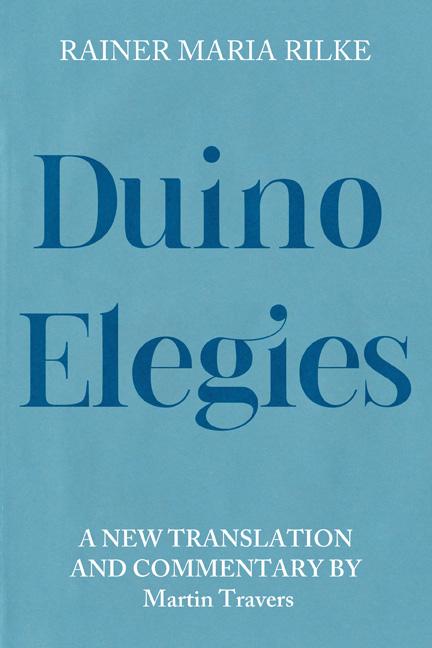Elegy 3
Published online by Cambridge University Press: 10 January 2024
Summary
The Third Elegy returns to the lovers, but now their “loving” is allied not to an emotional or psychic disposition (however disingenuous and rhetorically inflected that might have been in the earlier Elegies) but to the vitalistic pressures of the body and to its erotic energies, energies that point for some to “the problematic relations between impulse and personality” (Guardini, 91), and which come to their climax in the self-love of the son. After the first stanza, the female loved one (the “Geliebte,” who grammatically is already consigned to passivity) gives way to the figure of the mother and to a different type of “loving,” a loving in which maternal solicitation combines with repressive, if unobtrusive, control. The son hence turns inwards to explore the rampant potential of his instinctual life, a life that luxuriates in the primitive. The Elegy concludes with an invocation of a mythic landscape in whose barrenness the unspecified lyrical subject is led, through yet further atavistic recalls of the sexual unconscious.
Eines ist, die Geliebte zu singen. Ein anderes, wehe,
jenen verborgenen schuldigen Fluß-Gott des Bluts.
Den sie von weitem erkennt, ihren Jüngling, was weiß er
selbst von dem Herren der Lust, der aus dem Einsamen oft,
ehe das Mädchen noch linderte, oft auch als wäre sie nicht,
ach, von welchem Unkenntlichen triefend, das Gotthaupt
aufhob, aufrufend die Nacht zu unendlichem Aufruhr.
O des Blutes Neptun, o sein furchtbarer Dreizack.
O der dunkele Wind seiner Brust aus gewundener Muschel.
Horch, wie die Nacht sich muldet und höhlt. Ihr Sterne,
stammt nicht von euch des Liebenden Lust zu dem Antlitz
seiner Geliebten? Hat er die innige Einsicht
in ihr reines Gesicht nicht aus dem reinen Gestirn?
To sing of the beloved is one thing; but, oh, yet another,
to sing of that hidden guilt-laden river-god of the blood.
Him that she knows from afar, her young lover:
what does he understand of that lord of desire,
who out of his solitude (and before she could mollify him,
and often as if she didn't exist) raised up his godhead,
from a deep source dripping, and
called the night into unending turmoil?
Oh, the blood of Neptune: his terrifying trident.
Oh, the dark wind from his breast out of that voluted conch.
- Type
- Chapter
- Information
- Duino ElegiesA New Translation and Commentary, pp. 97 - 122Publisher: Boydell & BrewerPrint publication year: 2023

